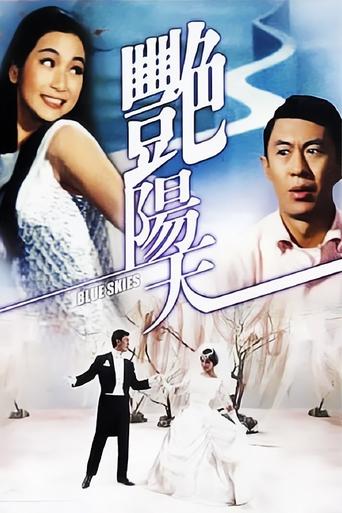

This is How Movies Should Be Made
... View MoreGood idea lost in the noise
... View MoreA movie that not only functions as a solid scarefest but a razor-sharp satire.
... View MoreEach character in this movie — down to the smallest one — is an individual rather than a type, prone to spontaneous changes of mood and sometimes amusing outbursts of pettiness or ill humor.
... View MoreEver since Shaw Bros. started releasing its library of titles from the 1960s and '70s, I've been curious about the musicals they produced and have watched quite a few, including HONG KONG NOCTURNE, HONG KONG RHAPSODY, THE LARK, and LES BELLES. For comparison's sake, I even started checking out some of the musicals released on DVD from Shaw's chief rival studio at the time, Cathay (BECAUSE OF HER, IT'S ALWAYS SPRING). I've been looking for that one breakout musical with elaborate and exuberant singing and dancing that would truly capture the spirit of 1960s Hong Kong and not just imitate Hollywood-style musicals. It's been a futile search so far, but not without its minor rewards.BLUE SKIES (1967) is considerably better than most of the other HK musicals I've been viewing, primarily because its star, Cheng Pei-Pei, is an actual dancer and a skilled one at that. She's superb in the action films she did at Shaw's, many of which I've reviewed, where she wields swords and whips and rides horses and flies up over walls and such (e.g., COME DRINK WITH ME, THE THUNDERING SWORD, GOLDEN SWALLOW, THE SHADOW WHIP, THE LADY HERMIT, etc.), but it's an even greater pleasure to watch her graceful movements as she dances, which she gets to do a lot here. She also gets to portray a more layered character than normal and displays a wider range of emotional stages. It turns out that she's not just a great action star but a very good actress as well.The plot involves that old chestnut from Hollywood musicals (think 42ND STREET) where the temperamental star of a popular stage show is incapacitated and the girl in the chorus who knows the part goes out and takes over and becomes a star in the process. Here, that girl is Chen Yun, a quiet, soft-spoken teenager (Cheng Pei-Pei) working backstage and secretly practicing, and she gets to play the leading role of a musical revue when the star, Hong Ling (Margaret Tu Chuan), makes unreasonable salary demands and walks out just before she's supposed to go on. The audience loves Chen Yun and the press eats up the story. Complicating matters is Chen's budding romance with the stage troupe's songwriter, Li Yannan (played by Shaw's leading musical comedy star, Peter Chen Ho), a source of irritation for the show's director (Tien Feng) and the man backing him, Boss Du, who covets Chen Yun himself. When the show is about to go on tour in Singapore, Li Yannan has an argument with the backer and winds up quitting the show in disgust and breaking things off with Chen, who reluctantly goes on with the troupe to Singapore. A tragic incident there sends Chen and the entire troupe back to Hong Kong, where hard times await. Li Yannan, however, has achieved great success as a composer for films and television in the meantime, but has no idea what happened to Chen Yun... The film's signature song, "Moonlight Over Lotus Pond," written for Chen by Li Yannan, is quite beautiful and I'm curious to know who actually sings for Cheng Pei-Pei, because the voice is very lovely. It's performed a couple of times midway through the film and, near the end, in a television performance by Shaw singing star Carrie Ku Mei, making a cameo appearance. The best scene involving the song occurs in a Singapore nightclub, where Chen drinks heavily in order to tolerate having to spend the evening with the boorish Boss Du. When the band plays the song, Chen starts to sing along and a violinist comes over and plays next to her as she sings, prompting Du to pull her by force out of the club and into his car outside. She never stops singing the whole time. It's a beautiful scene.The production numbers are a little more carefully and expensively rendered than their counterparts in the other HK musicals I've seen, although they're still not as good as I'd like them to be. The Beach Party number, for instance, is nowhere near as fun and exciting as the songs from the actual Hollywood "Beach Party" movies. But they're all watchable, including the "Big-Headed Kids" number where the dancers all wear big head-covering masks and have to do the "bamboo dance" while their vision is impaired by the masks. There's a cat-themed number at the beginning (and another one late in the film); a romantic dream sequence conjured up by a fallen-down drunk Li Yannan that turns into a nightmare; and a Little Mermaid-style "under-the-sea" finale.Other musical bits of note include the scene where Li Yannan does a Twist-like dance with his cute little niece to a record playing an instrumental version of the 1965 American Top 40 hit, "Wooly Bully." At another point, we see Li Yannan conducting a chorus and orchestra in a recording studio for a movie soundtrack, a rare glimpse, perhaps, of the Shaw Bros. production process.Overall, it's more of a romantic melodrama with musical numbers than a musical with a bit of drama, but it is a little better than most. The only other HK musical I'd rank it with so far, of the ones I've seen, is HONG KONG RHAPSODY (1967), which doesn't have the greatest musical numbers either, although it has a lot of them, but does have a better-than-average plot and strong performances by Peter Chen Ho and the leading actress, Li Ching.
... View More